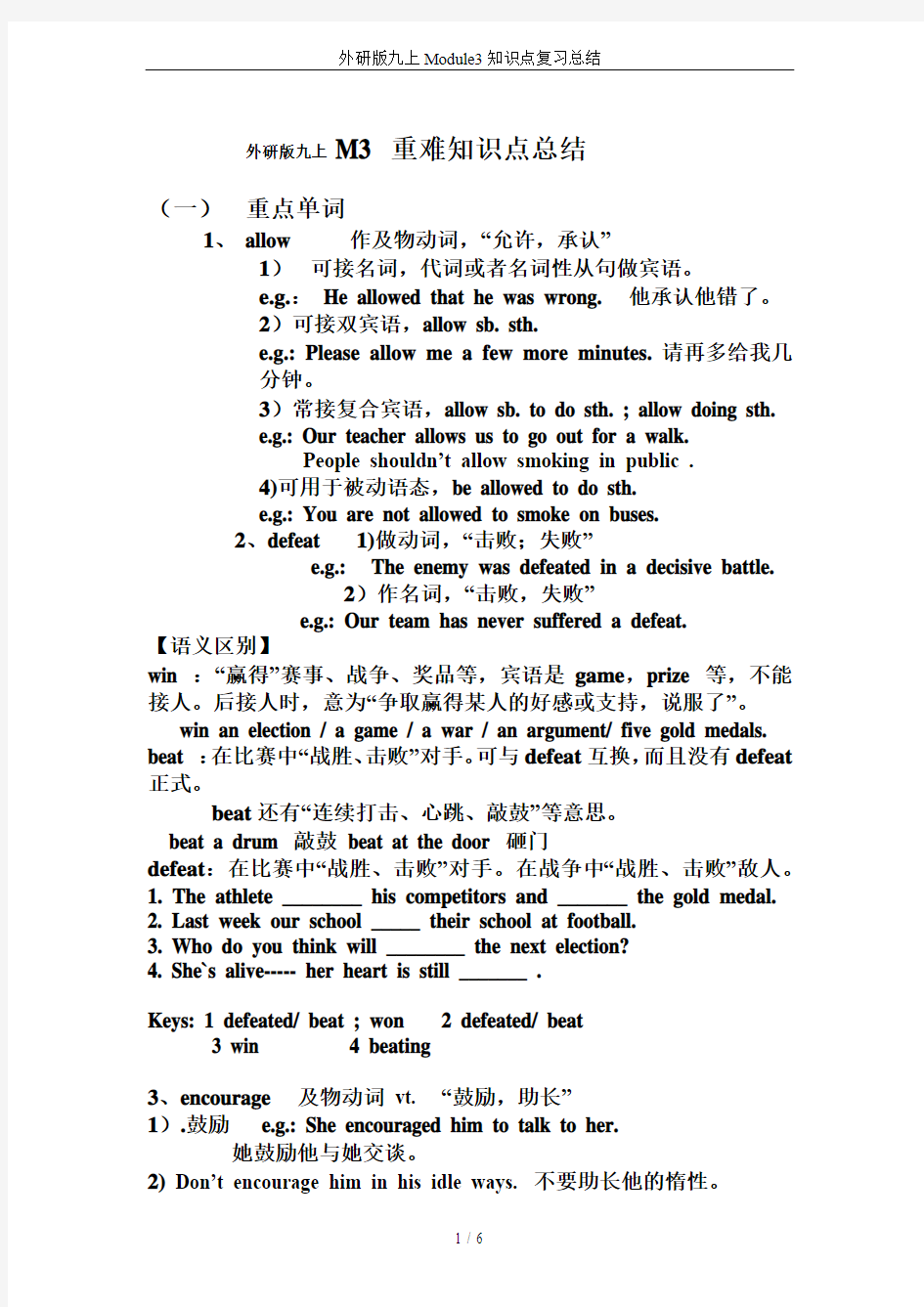外研版九上Module3知识点复习总结


外研版九上M3 重难知识点总结
(一)重点单词
1、allow 作及物动词,“允许,承认”
1)可接名词,代词或者名词性从句做宾语。
e.g.:He allowed that he was wrong. 他承认他错了。
2)可接双宾语,allow sb. sth.
e.g.: Please allow me a few more minutes. 请再多给我几
分钟。
3)常接复合宾语,allow sb. to do sth. ; allow doing sth.
e.g.: Our teacher allows us to go out for a walk.
People shouldn’t allow smoking in public .
4)可用于被动语态,be allowed to do sth.
e.g.: You are not allowed to smoke on buses.
2、defeat 1)做动词,“击败;失败”
e.g.: The enemy was defeated in a decisive battle.
2)作名词,“击败,失败”
e.g.: Our team has never suffered a defeat.
【语义区别】
win :“赢得”赛事、战争、奖品等,宾语是game,prize 等,不能接人。后接人时,意为“争取赢得某人的好感或支持,说服了”。
win an election / a game / a war / an argument/ five gold medals. beat :在比赛中“战胜、击败”对手。可与defeat互换,而且没有defeat 正式。
beat还有“连续打击、心跳、敲鼓”等意思。
beat a drum 敲鼓beat at the door 砸门
defeat:在比赛中“战胜、击败”对手。在战争中“战胜、击败”敌人。
1. The athlete ________ his competitors and _______ the gold medal.
2. Last week our school _____ their school at football.
3. Who do you think will ________ the next election?
4. She`s alive----- her heart is still _______ .
Keys: 1 defeated/ beat ; won 2 defeated/ beat
3 win
4 beating
3、encourage 及物动词vt. “鼓励,助长”
1).鼓励 e.g.: She encouraged him to talk to her.
她鼓励他与她交谈。
2)Don’t encourage him in his idle ways. 不要助长他的惰性。
4、record
1) 作名词,“最高纪录”
Set up a record 创纪录;hold a record 保持纪录;break a record 打破记录
2) 作动词“记录;记载;录音”
e.g.: Listen to the teacher and record what he says.
5、regularly adv. “有规律地”
e.g.: The mile man comes regularly every day.
regular adj. “规律的;固定的;经常的”
e.g.: His heartbeat is not regular.
6、race 1) 作名词,“比赛;竞赛
e.g.: Li lei ran faster than Jim in the 100-meter race.
2) 作动词,“跑;和……赛跑”
e.g.: We raced to put out the fire.
[race. game. match]
1.game 主要指决定胜负的游戏,通常有一套规则,凡参加者均需遵守。可以是体力方面的,也可以是脑力方面的,多用于美语。英国英语则用match. 这时,game和match可以互换。
a football game/match a Ping-Pong match/game a tennis match/game a boxing match/game After a game on the sports field they often become good friends.
在运动场上进行一场比赛之后,他们常常变成了好朋友。
They buy tickets or turn on their TVs to watch the games.他们买票或打开电视机看比赛。
2game 作复数时,一般指大型的国际体育运动会、比赛会或学校的游戏课、体育课。如:the Olympic Games=the Olympics 奥林匹克运动会。
3.race n. 赛跑;速度方面的比赛,如赛跑或赛车
racer n. 比赛者(包括人,动物,车辆等)
a horse race赛马
a 10-mile race 10英里赛跑
attending the dog races.参加赛狗大会
7、chance n. “机会;机遇”
give one’s a chance to do sth 给某人一个机会做某事
e.g.: Give me a chance and I’ll give you a surprise.
would you mind giving me a chance to speak, please?
2) have a chance to do sth / have a chance of doing sth有机会做某事
(二)重点短语
set up “建立,创立”
A new government was set up after the war.
新政府于战后成立。
“竖立;建立
The laid-off worker set up a vegetable stall in the morning market.
这个下岗工人在早市上支起了一个菜摊。
“使恢复健康”
Her holiday in the country has set her up.
get to “着手处理;开始;打动;影响;到达”
e.g.: His honest got to me.
When she got to the station, the train had already left.
first of all “首先;起初”
Never waste anything, but _____ never waste time.
A.the first
B. all first
C. first of all
He is the first student ______ school.
A. come to
B. comes to
C. comes
D. to come to the first + n.+to do sth. “第一个做某事的……”
now that 常常用来为一种新的情况或状况作出解释,表示“既然;由于”
e.g.: Now that you’ve grown up, you must stop this children behavior.
_____ you are not a child any more, you must think about your future.
A. Now that
B. Then
C. I f
D. Because of
make sure “确信;确保” 后面可以接that 从句。
e.g.: Make sure that you have turned off the gas before you go to work.
Make sure of “确实;确保;证实”
In order to get to work on time , you’d better make sure of time.
chance 偶然地
e.g.: I met him by chance.
bi gger and bigger “越来越大”
“形容词/副词的比较级+and|+形容词/副词的比较级”越来越……
e.g.: Summer is coming. It’s getting hotter and hotter.
“the +形容词/副词的比较级, the +形容词/副词的比较级” 越……就越……
e.g.: The harder you study, the more knowledge you will get.
So do I 我也是。
这是一个倒装句,当so 用于句首时,说明前面一句话表示的情况也适合另一个人或物时,句子要倒装。
so+Be动词/助动词/情态动词+主语”
“so+主语+ Be动词/助动词/情态动词” 表示赞同前者说的内容。“的确如此”
What do you reckon? 你怎么认为?
相当于What do you think?
1)reckon on 依赖;寄希望于
e.g.: I reckon on your help.
2) reckon…as/to be 以为;认定
e.g.: She is reckon to be the prettiest girl in the village.
(三)语法知识点
一般过去时和一般将来时
概念及构成
一般过去时的被动语态表示过去某一时间的被动动作或过去经常性、习惯性的被动动作,
句中主语就是原主动语态的宾语,动作执行者就是原主动语态的主语。was, were的使用由主语的单复数形式而定,主语为第三人称单数名词、代词或I时用was, 主语为复数名词、代词they或you时用were。如:
This bridge was built in October last year. 这座桥是去年十月份建的。These cakes were made by my mother last night. 这些蛋糕是我妈妈昨天晚上做的。
The girl said she was often beaten by her brother. 女孩说她经常被她兄弟打。
“主语+ was / were + 及物动词的过去分词+ by + 动作执行者”构成,无需说明动作执行者时可省去“by + 动作执行者”。
The room hasn't been cleaned yet.房间还没有打扫。
The tiger was killed by him.老虎被他杀死了。
当动作的执行者不是人时,多用被动语态。如:
The window was blown by wind.窗户被风吹开了。
The whole village has been washed away by the flood.整个村庄都被洪水冲走了。
4、表示客观的说明常用"It is + 过去分词."句型。
It is said that Lucy has gone abroad.据说露茜已经出国了。
It is believed that he is a spy. (=He is believed to be a spy.)大家相信他是个间谍。
其它常见的"It is + 过去分词+ that"句型还有
It is reported that…据报道
It is said that…据说
It is believed that…大家相信
It is suggested that…有人建议
